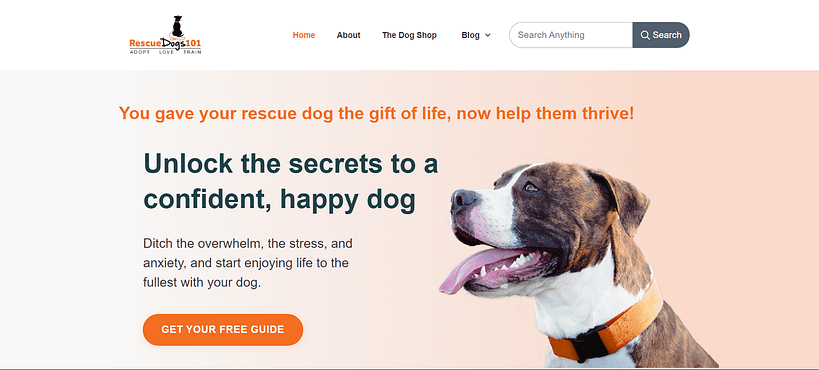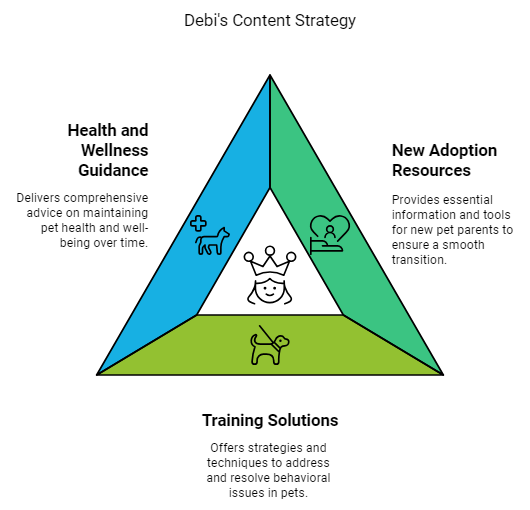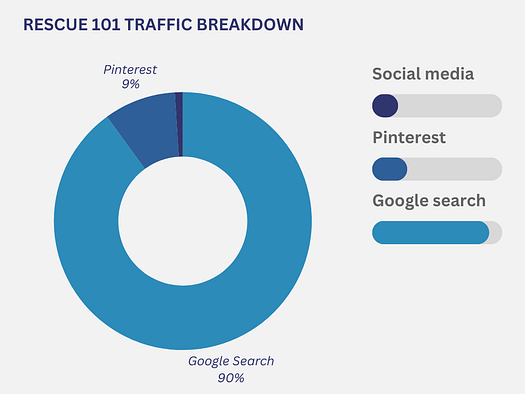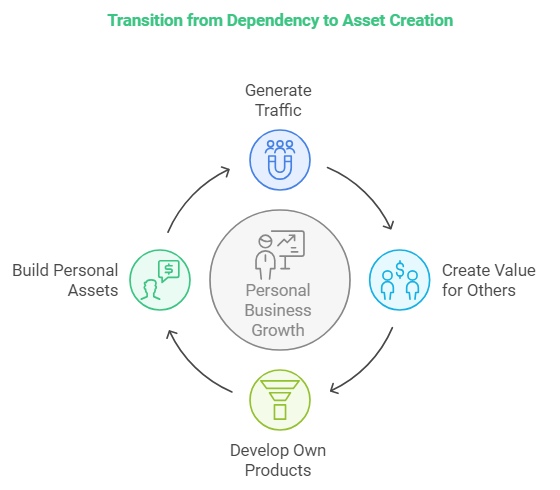When Personal Experience Meets Business Opportunity: Debi McKee’s Story
[ad_1]
The most successful online businesses often start with a simple goal: solving real problems for real people. But turning that goal into a sustainable business? That’s where things get interesting.
In our latest case study, we sat down with Debi McKee, founder of Rescue Dogs 101, to learn how she transformed her experience fostering dogs into a thriving online platform. Her journey offers valuable insights for anyone looking to build a business around their expertise.
From Side Project to Thriving Platform: A Designer’s Journey
After years of fostering dogs, Debi McKee noticed a pattern. New dog owners kept running into the same challenges – from pets not eating when brought home to being scared of family members. She saw an opportunity to help more than just one dog at a time.
That’s how Rescue Dogs 101 was born – an educational resource helping people navigate the complexities of dog adoption and training. But building an online business wasn’t as straightforward as she expected.

As a graphic designer with 30 years of experience, Debi had high standards for how her site should look and function. The basic WordPress setup she started with wasn’t cutting it. “I was really struggling to get it to look good,” she shared. Everything changed when she discovered Thrive Themes. “It was a life changer,” she recalls. “Just to be able to design a website the way that you want it to look.”
Today, Rescue Dogs 101 serves thousands of pet owners through blog posts, digital products, and online courses. Here are six key lessons from Debi’s journey that can help you grow your own online business.
6 Smart Business Lessons from Debi McKee
In her conversation with Tony, Debi shared how she transformed her dog fostering experience into a thriving online platform. From building her own digital products to smart email list segmentation, her insights show how to turn expertise into a sustainable online business. She breaks down exactly what worked, what didn’t, and how she adapted along the way. Here are the key takeaways from the discussion:
1. Create Content That Grows With Your Customer
A common mistake is thinking that customers only need help at the beginning of their journey. Debi discovered something different with Rescue Dogs 101 – pet owners need different types of support as time goes on.
“People think they adopt a dog and bring it in, and it may take a week or so when the dog’s happy and then there’s a happy ending story,” she explained. “But there’s really a lot to build on it.”
And this insight shaped her entire content strategy.

Instead of focusing solely on adoption and early training content, Debi developed resources for the entire dog ownership journey. Her content now covers everything from first-day adoption tips to advanced training and long-term health maintenance. This strategy has kept readers engaged for over five years.
“It’s funny because people think once you adopt a dog and bring it home, you give it a week or so until the dog’s happy and then there’s a happy ending story – but there’s really a lot to build on.
That’s why even people who have been with me for over five years still find themselves coming back to the website and resources, because things pop up over time. Things change, life changes.”
She structures her content into three main categories:
-
New adoption resources for fresh pet parents
-
Training solutions for ongoing behavioral challenges
-
Health and wellness guidance for long-term care

This strategy does more than just help her audience – it creates multiple opportunities to serve the same customers over time. Rather than constantly chasing new readers, she builds deeper relationships with existing ones.
The approach works because it mirrors real life. Just as your customers evolve, your content should evolve with them.
💡 Think about how your audience’s needs change over time and create resources that support them at each stage of their journey.
2. Choose Your Tech Stack Thoughtfully
For Debi, finding the right tools wasn’t just about picking the most popular options – it was about solving real business problems. Her journey from a basic WordPress theme to her current setup shows how technology choices should evolve with your business needs. After starting with a basic paid WordPress theme, she found herself struggling to achieve the design control she wanted.
“Back in those days, WordPress didn’t have blocks or anything like that. It was really hard to do anything with. As a designer, I wanted it to look good, but I was really struggling to get to that point. I don’t even know how I found you guys (Thrive Themes) in the first place, but it was a lifesaver because I didn’t want to spend hours and hours coding anymore – but back in the day, that’s what you had to do.” — Debi McKee
Thrive Themes, for Debi, let her create her website on her terms and with her vision in mind.
“It was a life changer,” she shared. “Just to be able to design a website the way that you want it to look with the templates and just the ability to add graphics and put things where you want it.”
A few things you can take from Debi’s experience are:
💡 The goal isn’t to have the most sophisticated tech stack – it’s to have one that supports your business efficiently. This practical approach to technology helps you focus on what really matters: serving your audience and growing your business.
3. Smart Email List Segmentation Pays Off
When Debi started segmenting her email list, she noticed something interesting: different subscribers were at completely different stages of their dog ownership journey. Some had just adopted, others were dealing with training challenges, and some were focused on their pet’s health.
“There’s three different types of people that come to me. People who have just adopted a dog, people who are struggling with either a training issue, and people looking for ways to keep their dog healthier.”
— Debi McKee
Rather than sending the same content to everyone, she created separate lead magnets and email sequences for each group. When subscribers download a specific resource, they’re tagged in her email system and receive content tailored to their needs.
“Someone who’s had their dog for 10 years doesn’t need to hear about transitioning their dog into their home,” she noted. This focused approach helps her maintain weekly communication while keeping content relevant to each subscriber.
The practical benefits of this approach include:
Debi’s process is straightforward but effective. New subscribers go through a 7-email welcome sequence based on their initial interest. After that, they receive weekly updates, plus targeted emails when she has something specific to their situation.
The key is starting simple. You don’t need to create complex segments right away. Begin by identifying your most common customer types and create specific content for them. As your understanding of your audience grows, you can expand your segmentation strategy.
This focused approach has helped Debi maintain long-term relationships with her subscribers – some staying engaged for over five years.
Pro tip
Email segmenting is a key part for any online business and can make a big difference in your overall conversion rate. Check out this detailed guide to learn how to segment your audience the right way.
4. Test Different Business Models Before Committing
Most course creators launch their product once and hope for the best. Debi took a different approach with her Canine Play Therapy Program, treating each launch as an experiment to better understand her market.
“This past year, I’ve launched it maybe four times. Each time I add something new, I change it, I change the way that I launch it.”
— Debi McKee
This willingness to experiment led to valuable information about what her audience actually wanted – and was willing to pay for.
Her testing process included several different models:
Not every experiment was successful. The membership model, which seemed promising in theory, didn’t gain traction.
“I thought it was going to be a great solution. In my mind, people needed that motivation, that kind of surrounding of other people who are going through the same situation.”
— Debi McKee
But with only two members signing up, the numbers didn’t work.
Instead of seeing this as a failure, Debi used it as valuable market feedback. She found that her audience responded best to the self-paced course at the $97 price point – a discovery that only came through testing different approaches.
💡 The most valuable insights often come from what doesn’t work. Each launch taught Debi something new about her audience’s preferences, allowing her to refine both her course content and delivery method. She continued making adjustments based on student feedback and results, showing that success often comes through iteration rather than getting everything perfect the first time.
5. Build Multiple Traffic Sources
When Debi started Rescue Dogs 101 back in 2015, her traffic strategy was laser-focused on SEO.
“If you asked me a year ago, the answer would be different. Last year I would say 100% was SEO driven.”
— Debi McKee
While this approach worked well initially, recent Google updates showed why relying on a single traffic source can be risky.
Her traffic breakdown used to look like this:

- 90% from Google search
- Roughly 10% from Pinterest
- 1% from social media
But instead of panicking when algorithm changes affected her traffic, Debi had already laid the groundwork for alternative traffic sources. She’d spent years building an engaged email list through targeted lead magnets, giving her a direct line to her audience that didn’t depend on search rankings.
💡 The lesson? While it’s fine to focus heavily on one traffic source that’s working well, always be building your backup channels. An email list, in particular, gives you direct access to your audience regardless of platform changes or algorithm updates.
6. Content Creator? Make Room For Your Own Products, Too
For writers and other content creators, it’s easy to fall into a comfortable pattern with ads and affiliate marketing. And I can see why – these are straightforward ways to start making money from your content. But Debi McKee’s story shows why this might not be the best long-term strategy.
Looking back at the early days of Rescue Dogs 101, Debi admits she focused heavily on traffic and ads.
“Looking back, I wish I would have focused more on my own product line right from the start, like from day one,”
— Debi McKee
While the ad revenue was good, she discovered something interesting when she started creating her own digital products.
The benefits became clear quickly:

For Debi, the transition to selling her own digital products wasn’t just about making more money. It was about better serving her audience. She could create exactly what her readers needed, price it fairly, and continue improving it based on feedback. Today, her product line includes courses and printable resources that help dog owners at every stage of their journey.
💡 The lesson? Don’t wait years to start developing your own products like Debi did. Once you understand what your audience needs, start creating solutions for them. They don’t need to be perfect – they just need to be helpful. Remember: Your expertise, packaged into the right product, could be exactly what your audience is waiting for.
It’s Your Turn Now
There’s a lot to take away from this case study — and this is just the written summary. You can watch the full conversation between Debi and Tony right here:
Debi’s evolution from graphic designer to trusted dog training expert – inspired by her hands-on experience fostering dogs – demonstrates how passion projects can become thriving businesses. Her practical approach to growing Rescue Dogs 101 provides valuable lessons for anyone looking to build an expertise-based online business.
For Debi, Thrive Suite solved the technical challenges that were holding her back, allowing her to create the professional platform she envisioned. What began as a way to avoid coding has become essential to her success, enabling her to build and maintain a comprehensive educational resource without technical headaches.
Start Your Journey with Thrive Suite
You can do the same thing, too. Starting with building a website that puts your business in the best light.
Thrive Suite, our premium WordPress plugin bundle, is your key to creating a profitable online business.
You’ve waited long enough to bring your new ideas to life. There’s no better time to start like now.
Purchasing this bundle saves you from spending $1000+ on five to six plugins to try to achieve the same results. Giving you more time and resources to implement marketing strategies that lead to more sales for your business.
These plugins are easy to use, offer an expansive library of customizable templates, and are updated regularly – helping you stay ahead of the competition.
What are you waiting for?
Get started with Thrive Suite today.
[ad_2]
منبع:totalwptheme